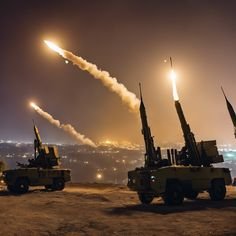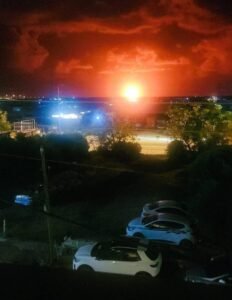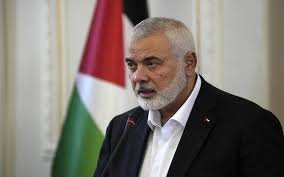
Update on Iran Attacking Israel the geopolitical scene in the Middle East has been increasingly unstable, with tensions among Iran and Israel at alarming levels. Recent developments have further intensified this situation and led to the use of missiles and military machinations. Update on Iran Attacking Israel this article offers a comprehensive review of the reasons behind this increase in tension, the reactions by Israel as well as the larger consequences of Iran’s aggressiveness towards the region’s adversaries.
What Caused the Recent Update on Iran Attacking Israel?
Update on Iran Attacking Israel the root of the conflict among Iran and Israel are traceable back to a long period of history as well as political and ideological conflict. A variety of factors are responsible to the latest escalation in tension

1. Ideological Differences
The root of the conflict between Israel and Iran is the existence of a major ideological divide. Iran is one of the Islamic Republic since 1979, believes Israel as a state that is not legitimately that was established by the expulsion of Palestinians. Update on Iran Attacking Israel in contrast, Israel perceives Iran’s revolutionary philosophy of promoting anti-Zionism as well as support for organizations such as Hezbollah and Hamas, as a direct danger to its very existence. It has been a source of animosity that keeps both countries in a constant battle for many decades, causing conflicts and mistrust.
2. Nuclear Ambitions
Update on Iran Attacking Israel the pursuit by Iran of nuclear weapons has raised global concern in particular within its adversaries in the region which includes Israel. Israel frequently expressed its concerns about the possibility that Iran has been working towards creating nuclear weapons that could alter in the power balance within the Middle East. International negotiations over the Iran nuclear program have only increased tensions. Update on Iran Attacking Israel Israel is concerned that a weakening position by the world’s powers could encourage Iran to increase its nuclear ambitions and lead to an conflict over arms in the region.
3. Proxy Conflicts
The support of proxy groups by Iran in the region has led to the rise of tensions. Update on Iran Attacking Israel through providing financial and military assistance to groups like Hezbollah from Lebanon, Hamas in Gaza and numerous militias across Syria, Iran maintains a strategically important position in the key regions that surround Israel. These proxies directly threatens Israeli security, and has contributed to numerous conflict situations, such as missile attacks as well as military conflicts.
4. Regional Power Dynamics
The larger geopolitical issues that are taking place in the Middle East have exacerbated tensions. Iranian influence is growing, in particular in the wake of the U.S. withdrawal from the Iran nuclear agreement (JCPOA) and its subsequent reinstatement of sanctions is affecting Israel’s standing and caused the Israeli government to take military action. In addition, the normalization agreement with Israel as well as a number of Arab countries, like Bahrain and the UAE and Bahrain are forming new alliances to are challenging Iran’s power within the region.
5. Recent Events
The primary triggers behind the recent flare-up have been the military’s actions as well as hostile words on both parties. Update on Iran Attacking Israel the occurrence of missile strikes conflict of low intensity along the northern border of Israel, as well as provocation from Iranian officials have created an atmosphere that’s ripe for war. Recent flurry of missiles launched by Iran has exacerbated the war, highlighting the importance of this conflict.
How Has Israel Responded to Iran’s Missile Attacks?
Update on Iran Attacking Israel as a response to attack on the missiles from Iran in response, Israel’s military as well as government have implemented an extensive strategy that focuses on protecting the security of its nation and showing its commitment to countering hostile acts.

1. Military Retaliation
Israel has a long history of reacting aggressively to missile attack. In the aftermath of missile attacks attributed to Iran or its proxy, Israel’s Israel Defense Forces (IDF) have carried out precision airstrikes on Iranian forces, military equipment’s, depots and launch places in Syria and various other areas. This retaliatory strike points to stop inescapable dangers, yet in addition forestall future hostility through exhibiting the tactical ability of Israel.
2. Elevated Military Readiness
Given the heightening risks, Israel has raised its degree of military readiness, sending additional soldiers toward the northern boundary and updating air safeguard frameworks that are prepared to hinder robots and rockets. Update on Iran Attacking Israel its Iron Arch enemy of rocket guard component is working in full ability to shield the non military personnel populace from potential assaults showing Israel’s assurance to safeguard its residents.
3. Strategic Commitment
Update on Iran Attacking Israel as well as military mediations, Israel has taken part in conciliatory endeavors to win global acknowledgment. Israeli officials have increased efforts to reach out to allies especially those from the United States, seeking reinforcement of their shared security interests. Israel insists on an all-inclusive line of attack against Iranian aggressiveness, while leveraging its relationship with U.S. for strategic support and weapon system.
4. Digital Activities
Israel is a smart digital fighting capacity, that has been used against Iranian objective. Cyberattacks intended to subvert Iran’s framework and military are presently a fundamental piece of Israel’s techniques. However points of interest of specific assaults could stay mysterious in any case, we realize that Israel is effectively trying to debilitate Iranian capacities with no any immediate military struggle.
5. Public Informing
Israel has additionally been taken part in open discretion to introduce its situation to the global and homegrown public. Update on Iran Attacking Israel government authorities’ assertions feature the danger to Israel’s security that is acted by Iran like well as its intermediary associations and make a feeling of pressing requirement for facilitated activity against Iran’s forceful methodology.
What Are the Ramifications of Iran’s Hostility Towards Israel?

The continuous conflict that is seething among Iran and Israel has suggestions broad that rise above their limits and influence security in the district, world political elements, as well as security inside the Center East.
1. Increased Risk of Military Conflict
The current course of war carries the danger that there will be a complete conflict among Iran as well as Israel. Every exchange of fire could rapidly escalate, leading to bigger military confrontations which could bring in more states as well as other non-state actors in the region. A regional conflict raises concern regarding global energy markets as well as international security.
2. Impact on Global Politics
The tensions that exist between Iran and Israel take place in the context of changing international alliances and a shifting U.S. foreign policy. When as the U.S. reassesses its role in the Middle East post-Afghanistan withdrawal, other powers around the world could seek to gain influence over this region, further complicating the already complex geopolitical situation. What you and the U.S. and its allies react to any new tensions will play a major role in determining the direction of the events.
3. Humanitarian Consequences
Update on Iran Attacking Israel armed conflict is a constant trigger for humanitarian emergencies. When there is an extensive conflicts, civilians on both sides can suffer substantial losses as well as displacement. The Iranian support of proxy groups usually leads to an rise in the number of rockets fired at Israeli areas of population, which can trigger revenge strikes, which further threaten civilians across both nations as well as the surrounding regions.
4. Regional Alliances and Realignments
With tensions rising the regional alliances could shift. The countries that traditionally have a strong ties with Iran could reconsider their positions in the face of fears of instability as others might strengthen relationships to Israel. The dynamics surrounding the Abraham Accords, which saw the normalization of relations among Israel and a variety of Arab states, could change as new alliances emerging as a result of Iranian violence.
5. Proliferation of Military Capabilities
Iran’s aggressive actions could spark an arms race within the region. States that are concerned about Iranian influence could want to increase their capabilities in the military, possibly making more complex missile defense systems as well as other technological advances in the military. Update on Iran Attacking Israel a quest for more advanced weapons could result in higher amounts of secrecy as well as greater sophistication when it comes to military advancements.

END
The growing tensions among Iran and Israel are a sign of an one of the more emotional and persistent conflicts of modern geopolitics. Update on Iran Attacking Israel ideological divisions, nuclear ambitions as well as proxy conflicts remain a major factor in shaping the conflict scene. Israel’s vigorous military response reflects the country’s commitment to security and international cooperation is vital to stop any further conflicts.
The situation is advancing, being aware of the causes, reactions as well as the implications of this conflict is vital to comprehend the complex dynamics of the Middle East. As the possibility of increasing tensions, those involved must remain on guard by monitoring developments and observing them to better manage a volatile and complex zone. The geopolitical saga that is playing out between Iran and Israel continues to be central to the development of Middle Eastern and global security in the years ahead.






